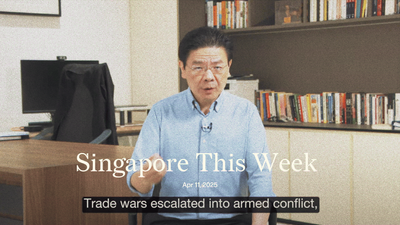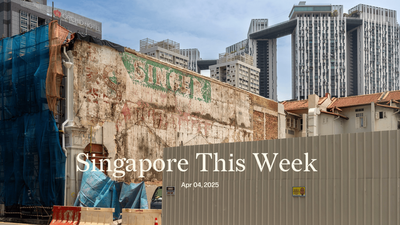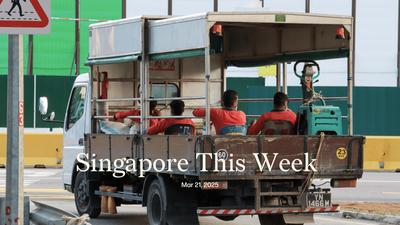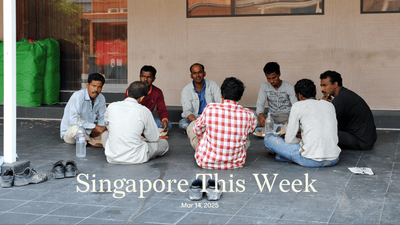Politics: Amending the Constitution, and backdating it, for Tharman
When Tharman Shanmugaratnam, president, performs roles in international organisations, should he do so in an official or a private capacity? Which best serves Singapore’s national interest? These were some of the questions that were insufficiently dealt with as Parliament rushed through its latest constitutional amendments. These will allow the president—and, in a separate analogous amendment, ministers—to accept international appointments in their personal capacities, subject to some conditions, including Cabinet’s right to assess if it’s in the national interest for them to do so. Tharman already holds four international positions in his official capacity, including chairing the board of trustees of the Group of Thirty (G30); and co-chairing the Global Commission on the Economics of Water. If he continued doing so in this manner, “...he would be limited to representing the official Singapore position in everything he says,” said Lawrence Wong, deputy prime minister. “That would not be in keeping with the requirements of these organisations. Nor would it be in the interest of Singapore for our president to be so limited, as it restricts our ability to shape global conversations and initiatives.” But if Tharman, previously as senior minister, could perform these roles in an official capacity, why does he now, as president, need the latitude to serve in a private capacity? This was one of the many seeming contradictions highlighted by opposition members of Parliament, namely Gerald Giam and Jamus Lim of the Workers’ Party, and Leong Mun Wai of the Progress Singapore Party. The two parties said they’d be supportive of the president performing these roles in an official capacity, but not private, as this bill allows. In opposing it, they had other valid arguments: it’s unclear how independent Tharman’s “private” views can be if he ultimately must act in accordance with the Cabinet’s advice; citizens, who effectively foot Tharman’s S$1.5m annual salary, may expect him to dedicate his time fully to on-the-ground work; the backdating of this bill to September 14th, when Tharman was appointed president, is perplexing, given that his current appointments are apparently constitutional. To the last point, Wong said that this retrospective implementation was done “out of an abundance of caution”, though he did not elaborate on what specifically concerning Tharman’s roles the government needed to be cautious about. This, and other explanations from Wong and Christopher de Souza, his colleague from the ruling People’s Action Party (PAP), were, in our view, unsatisfactory. Many Singaporeans will be left wondering why the PAP has once again amended the Constitution, as it’s done over 50 times since it was first elected in 1959. This ambiguity may ultimately hurt the PAP—one reason for citizens to vote against it at the next election is to deny it the two-thirds majority it needs to change the Constitution, a sacred document. Tharman, no doubt, will be pleased, for he can continue with his superhuman endeavours: one minute, the macha on the ground in Jurong, and the next, the effete intellectual in Davos.
Society: Die also expensive
Sticker shock in the world’s costliest city afflicts not just the living, but the dead. Last Friday, a market study conducted by the Competition and Consumer Commission of Singapore (CCCS) urged local funeral service providers to provide more clarity on their pricing and offerings, highlighting the current potential for unfair practices and misleading claims. According to the study, supported by the National Environment Agency (NEA), consumers “do not generally have a good sense of how much funeral products cost.” More than a quarter of those surveyed expected funerals to cost less than S$1,000. In reality, the median respondent who had experience planning a funeral paid between S$5,000 and S$8,999, with only one percent paying less than S$1,000. The opacity surrounding prices and package offerings plus the option to purchase various add-ons can confuse already vulnerable consumers, some of whom may be “impaired in their ability to make informed decisions” under pressure. Since 2021, CCCS and the Consumers Association of Singapore (CASE) have received 13 complaints against funeral service providers—most of them related to billing and charges that were not previously disclosed. In one case, a client who had opted for an S$8,000 package ended up being charged S$20,000. To combat this, CCCS encouraged funeral service providers to: be more transparent about what items are included in a package; inform consumers that package prices are subject to change; and to issue a detailed invoice with a copy of terms and conditions. Hoo Hung Chye, executive director of the Association of Funeral Directors, criticised CCCS for a slew of supposed errors, including the “limited” sample size of 500 people; and failing to differentiate between middle-men and “proper funeral service providers”. He also pointed out that 13 complaints over three years was “inconsequential”, wryly suggesting that “others should take a leaf from the funeral profession as to how to achieve a near zero complaint level.” His defensive and self-righteous tone aside, it’s difficult to agree with all of Hoo’s objections. Melvin Yong, president of CASE, pointed out that the number of complaints they received is “likely to be a fraction of the actual grievances”, since consumers may choose to “close [this] sad chapter in their lives and move on” instead of pursuing the matter. Indeed, in a society that often prizes the rights of capital and business over consumers and workers, it’s refreshing to see government bodies growing some teeth, and standing up for the latter.
Society: Still a ways to go to give every child the best start in life
Pre-school children from higher income families, whose parents are better educated, fare better in their studies compared to counterparts of a lower socioeconomic status (SES)—measured using their parents’ annual income and educational qualifications. Not only do these children excel in language and numeracy skills, they’re also more able to practise strong self-control, thus delaying gratification, which is positively associated with early cognitive development. These were key research findings from the survey of 2,940 children aged three to six years. Published in the Early Childhood Research Quarterly, an international academic journal, it’s the first study on early childhood development in Singapore based on a nationally representative sample of families with young children; taken from the 2018-2019 Singapore Longitudinal Early Development Study. Higher-SES families, the paper highlights, outperform in key early childhood metrics—parental values (in terms of providing a nurturing home environment), investment in children and children’s self-regulation. It’s been well-researched that early childhood development predicts achievement gaps at later ages—leading to long-term implications to a person’s life chances, while contributing to intergenerational poverty. These findings are significant given the government’s Forward Singapore resolve to tackle income inequality and strengthen social mobility. The PAP extols the virtues of meritocracy, but academics have questioned whether the Singapore variety has instead created the “structural and cultural conditions that reproduce inequality and elitism.” In a 2018 TODAY commentary, Ong Ye Kung, then education minister, contended that children from more affluent families do better in school than those from lower income backgrounds, with privileges being passed on to the next generation. Singapore’s pre-school environment has improved by leaps and bounds in the past decade with increased affordability and accessibility, but more could be done to help reduce social inequalities. For starters: boost the enrolment rate of children from lower-income families—still below the national average; raise the minimum qualifications for teachers; and pay them more.
History weekly by Faris Joraimi
The Israeli strangulation of Gaza—now in a four-day “pause”—lurks in the background as we go about our daily errands and tasks. Even those who can attend protests are reminded of their relative privilege to do so. Our comfort haunts us. In the words of Han Suyin describing the Malayan Emergency, “We lived and breathed it. It penetrated our pores, we chewed it with every mouthful of food.” And then there’s the information war online. Would we suffer less if humanity didn’t have such amnesia around basic historical facts: like how anti-semitism was invented in Europe, that it wasn’t the Palestinians who performed the Holocaust, or that Zionism and Judaism are different things? A historian friend of mine once joked that our “job” is mostly cleaning up the mess made by people who benefit from selective interpretations of the past. Cleaning up is essential work, of course. Though historians rarely succeed. This problem is universal as we’re familiar with in Singapore, but the consequences are far more dire in contexts other than ours. Perhaps it is arrogant to assume we can set things right. Recently, I watched a conversation between the novelist Salman Rushdie and the Palestinian American scholar Edward Said from 1986 (a meeting of legends). At one point, Rushdie asked Said about the constant burden of debunking propaganda framing Palestinians as terrorists who have no claim to their homeland. How does it feel, he asked, to always have to retell the story from the beginning, “because so many lies have intervened? Does that get tiring?” Said replied, “It does. You find yourself having to do it every time, but you do it anyway. [...] But it’s very hard to do that because you have to work out everything and get past a lot of information in the daily press, you know: ‘Why don’t Palestinians just stay away? Why are they such troublemakers?’, and that immediately launches you into a tremendous harangue. Our history was this, and we were there, and I tell people my mother was born in Nazareth, my father was born in Jerusalem—I’m bored by the whole story, but you feel you have to do it. And the interesting thing is that there seems to be nothing in the world that sustains the story, that keeps it there. In other words, unless you’re telling it, it’s gonna drop and disappear. Sort of like Scheherezade. Perpetually told and retold, whereas you feel the other narratives are permanent and have a kind of institutional existence, and you just have to try and work away at them.” To write history is to be sort of like Scheherezade: refusing disappearance by telling stories, again and again.
Arts: Dance dance revolution
Two site-specific dance works take up residence in two very different locations this weekend. The first is the fever dream of “M/MPI: thon”, a three-day dance marathon at the Grandstand by Malay dance company P7:1SMA (pronounced “prisma”). It invites the audience to spend several nights lepaking through a series of all-night dance activations and events, including a sharing on the Iban dreamweavers of Borneo by museum docent Hafiz Rashid, as well as a jamu making session with mixologist Zac Mirza, where you’ll get to try his herbal elixirs with a twist. “M/MPI: thon” is part of the company’s ongoing exploration of the embodiment of dreams or mimpi, drawing from dream mythology, ritual and philosophy from the South-east Asian archipelago. On the other side of the island, T.H.E Dance Company will be concluding its year-long 15th anniversary season with “Searching Blue”, which begins at the Goodman Arts Centre in Mountbatten and takes audiences on an outdoor journey; you’re encouraged to bring an umbrella and brave the rainy season. To cap off the heavy dance programming this month, the Esplanade is presenting its final da:ns focus weekend for the year, “Full Out!”, a street dance showcase that begins this week with a dense lineup of workshops for both beginners and professionals. Esplanade has reworked its flagship da:ns festival programming for the first time in 17 years, choosing to spread its dance offerings across five weekends instead of the usual compact festival fortnight. Previous dance-themed weekends this year at the national performing arts centre have included one on the intersection of dance and disability, another on how text might inform choreographic practices, and another dedicated to being an intermediary between Asian artists and regional audiences and programmers. Arts organisations have had to radically rethink programming, ticketing and outreach strategies in the wake of Covid-19, and many arts festivals and events are still recovering from the post-pandemic audience slump, stemming partly from a “wait-and-see” attitude. Will the dance revolution return? Might take a bit of fancy footwork from everyone involved.
Arts: Singapore Writers Festival changes hands
The Singapore Writers Festival concludes this weekend, marking the end of poet Pooja Nansi’s five-year tenure as festival director. She will be succeeded by Yong Shu Hoong, yet another in a line of Chinese male poets who have helmed the flagship literary festival (previously: Paul Tan, National Arts Council deputy chief, and Yeow Kai Chai, a former Straits Times journalist). Nansi has been outspoken about her experience shepherding the festival as both a gender and racial minority, and her programming has reflected these positionalities. She told CNA last year: “...I’m constantly looking at diversity. Former directors have already been sensitive to that but it hits differently when you occupy that body yourself. […] How can we have more people in this space? How can we include more voices? How can we make this relevant to more people? Who’s not coming and why aren’t they showing up? What do we need to include that they want to come and see?” Her star-studded festival editions have included queer and Black feminist literary rockstars, including Roxane Gay, Claudia Rankine, Jeanette Winterson and Ocean Vuong. She’s also made it a point to recognise brown female voices from Singapore; last year’s Literary Pioneer Exhibition was the first to celebrate pioneering Malay women writers (including Adibah Amin, Hadijah Rahmat, Raja Aisyah Sulaiman, Rasiah Halil and Sa’eda Buang) with the slogan “Bukan mungkin lagi, mesti!” (“Not an if, but a must!”). Nansi has also made various access services visible to the broader public, with live speech-to-text interpretation available for d/Deaf and hard-of-hearing audiences, as well as meticulously captioned video recordings of festival highlights. Nansi’s densely packed festivals have also been strategic in their mix of pop culture provocations (celebrity book culture! BookTok!) alongside academic heavy-hitters like Gayatri Chakravorty Spivak. She’s also managed the sprawling festival through early motherhood and a global pandemic—no small feat.
Tech: Electrifying the streets of Singapore
Hyundai has formally opened its electric vehicle (EV) factory that’s been in operation since early this year. The plant will help it establish a foothold in Singapore’s burgeoning EV industry, spearheading innovation and production here. Described as a critical component of Hyundai’s ongoing electrification strategy, the facility, with a productive capacity for 30,000 EVs annually, will perform half of its operations using 200 robots, paving the way for technologically advanced production methods that eschew traditional conveyor belts. The plant is currently producing the IONIQ 5 EV and the autonomous IONIQ 5 “robotaxi”, and plans are in place to manufacture the IONIQ 6 sedan from next year. In a déjà vu moment, Lawrence Wong, deputy prime minister, acknowledged the country’s historical significance as a vehicle assembly centre—the former Ford Factory in Bukit Timah stopped production in 1980. He also expressed optimism about the return of high-value automated industries to Singapore, due to the ongoing electric shift in the automotive sector. This development aligns with the country’s roadmap towards a more sustainable and innovative future in mobility. But some remain sceptical about the greenness of electric vehicles given that the materials are mined. Still, the US Environmental Protection Agency has asserted that compared to their internal combustion engine counterparts, electric vehicles are still notably cleaner. One wonders, though, why anyone needs a fancy electric car, when local trains and buses can travel from the north to the south of the island in under an hour—provided that they don’t break down.
Tech: Towards a more regulated blockchain world
China and the United States are increasingly regulating the cryptocurrency industry. The Monetary Authority of Singapore (MAS), similarly, is trying to foster a safer and more innovative digital currency ecosystem in Singapore. First, MAS published comprehensive guidelines that outline the tech infrastructure necessary to bolster digital transactions. This will support services like wholesale central bank digital currencies (CBDCs), tokenised bank liabilities, and stablecoins. Key aspects of the promoted infrastructure include a settlement ledger for recording digital money transactions, and a tokenisation bridge for connecting existing accounts with ledgers compatible with tokenised finances. According to MAS, the blueprint was formulated based on findings from industry trials conducted under Project Orchid. It also includes protocols related to purpose-bound funds and solutions for making digital wallet addresses, typically complex strings of alphabets and numerals, more user-friendly for verification purposes. In 2024, MAS plans to start developing a wholesale interbank settlement CBDC. Initial trials aim to use the CBDC to settle retail payments among commercial banks, whilst later tests will delve into cross-border securities trading. Ravi Menon, MAS managing director, stated that the issue of a wholesale CBDC underpins the pivotal role of central bank money in promoting safe and efficient payments. Beyond the launch of the new framework, there are significant shifts in the leadership of Binance, a leading cryptocurrency exchange. Richard Teng, current Binance Singapore CEO, as well as ex-regulatory officer at the Singapore Exchange and MAS director of corporate finance, succeeds Zhao Changpeng as Binance’s CEO. The transition arrives as Zhao pleads guilty to violating US money laundering laws following a lengthy investigation into the crypto exchange. Prior to this role, Teng led regional teams at Binance, where he was instrumental in securing strategic partnerships and fostering innovation. As CEO, Teng aims to reassure users about the company’s financial stability, security, and safety, and vows to work with regulators to maintain high global standards and drive the growth and adoption of Web3.
If you enjoy Jom’s work, do get a paid subscription today to support independent journalism in Singapore.








